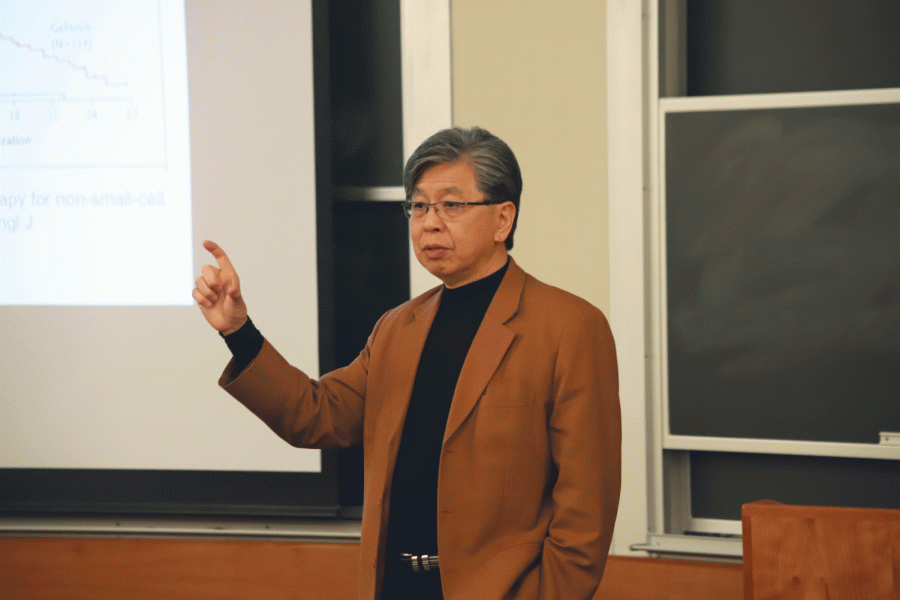The Future of Genomics and Breast Cancer According to Dr. Edison T. Liu
Dr. Edison T. Liu’s lecture emphasized the progress that has been made in the field of cancer biology and genomics.
Imagine a world without breast cancer. Dr. Edison T. Liu, who recently spoke at Colgate University, suggests that this is entirely possible by the year 2045 due to the growing focus on personalized medicine and the extensive research in the field. As for evidence supporting this heavily-weighted claim, Liu points to the linearly decreasing mortality rate for breast cancer – a phenomena he believes will continue in the coming years.
On Thursday, March 29, Liu, a leader in the field of cancer biology and genomics, gave a lecture with the title “Genomic Biology in Cancer Medicine.” He discussed his research, which primarily focused on the functional genomics of human cancer and showcased the way that focusing on an individual’s genome can help reveal the genetic cause of the cancer and ultimately lead to a solution.
First-year Morgan Wynkoop found Liu’s talk optimistic.
“Dr. Liu’s lecture was inspiring because it showed that research has the capability to help so many people with a such a serious illness. It’s amazing how much progress has been made in cancer research,” Wynkoop said.
While Liu’s research has been primarily focused on breast cancer, he believes that future generations’ work in this field will be focused on rewriting the genomein terms of the larger implications of his work.
Liu was formerly the president of the Human Genome Organization. He remarked that his generation carried out the task of reading the genome, but there is still work to be done.
Doing so would help to treat a myriad of health conditions as well as handle the actuality and potentiality of a world in which parents have the ability to choose a multitude of their children’s characteristics.
First-year Chelsea Munger reflected on the lecture.
“Even though I couldn’t quite understand each and every slide, I could still keep up with what his studies were in general. I also understood the importance of what he was saying. At the end when he answered questions, his intelligence was so obvious and overwhelming as he immediately had such good answers to every question,” she said.
Within this conversation of using genetics to understand and treat conditions such as cancer, there is already a legacy of this type of science on a somewhat less personalized level – the subset approach. While the ideal approach to treatment that Liu describes has an intense focus on the individual’s genome, predecessors of this philosophy include a subset approach to genetics, which entails demographic-based genomics. In the past, a focus on the genetics of various demographic groups has tended to lead to pseudoscience and bigoted perceptions of “racial superiority,” instead of actual medical advancements. However, the categorization of people based on genetic similarity can be beneficial in developing treatment. In certain cases women may show a proclivity for a specific disease or condition, and the process of finding these subset-scale predispositions for diseases can result in accurately targeting the genetic cause of the condition.
Liu offered his unique perspective on research.
“Research is much like good art,” he said.
He explained that scientific research is characterized by true experimentation, uncertainty and reward of diverse approaches. Often it is thought of as being a field of absolutes. However, from Liu’s perspective, research and the study of the human genome is presently and in the coming years a field that demands creativity. Whether it be to treat breast cancer or solve any other affliction that genomics has the potential to improve, Liu believes that the greater scientific questions of the coming years will center around the “rewriting of the genome.”
Here, where the prospect of a future generation creating the genomes of the people of tomorrow, the scientific developments coinciding with greater questions for the international community, what we will protect and how we can maintain a culture of both freedom and equality of opportunity are questions to think about when thinking about the future. However, Liu is optimistic about the future of scientific research in the fields of cancer biology and genomics.
“These are exciting times [for researchers and society],” he said.
Contact Shelby Stevens at sstevens@colgate.edu.





